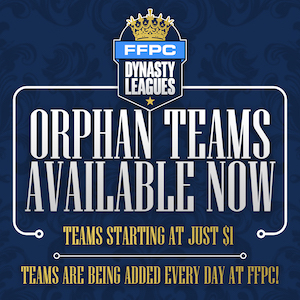Which teams pulled off the biggest Super Bowl upsets of all time? Joe Nicely ranks the five greatest upsets in Super Bowl history ahead of this year's big game.
With the Super Bowl fast approaching, it's the perfect time to catch up on the history of football's biggest game. America loves the Super Bowl and America loves an underdog, so why not put them together?
In this article, we'll rank the top five biggest upsets in Super Bowl history. These won't necessarily be ordered strictly according to point-spread upsets, because that would be pretty boring. Instead, we'll list the upsets that were both the most surprising and impactful.
Without further delay, let's dive into the Super Bowl's most shocking outcomes!
Featured Promo: Looking for some more fantasy football action? Adopt a dynasty orphan team over at FFPC. Sign up today and get $25 off any FFPC league. Sign Up Now!
5. Super Bowl IV
Kansas City Chiefs 23, Minnesota Vikings 7
The Minnesota Vikings entered Super Bowl IV looking for their first world championship. 53 years later, they are still looking.
This Minnesota squad coached by NFL Hall of Famer Bud Grant was a wrecking crew. The 1969 Vikings closed the regular season with a 12-2 record. Minnesota was dominant on both sides of the ball, boasting an offense that led the NFL in points scored, while their "Purple People Eaters" defense allowed the fewest points in the league.
They entered Super Bowl IV as 13.5 favorites over the AFL champion Kansas City Chiefs. Even though the AFL's New York Jets had won the previous year's Super Bowl, the AFL was still considered by almost everyone to be the inferior league and Kansas City appeared to be no match for the superior Vikings.
However, the scrappy Chiefs, led by quarterback Len Dawson at the helm of head coach Hank Stram's offensive gameplan, jumped on the mighty Vikings early and never looked back. Kansas City led 16-0 at halftime, and though Minnesota cut the lead to 16-7 in the third quarter, the game was never really in doubt.
Dawson was named the MVP of Super Bowl IV. Grant and his excellent Vikings team would reach three more Super Bowls in the 1970s, but went 0-4 across the decade in football's biggest game.
4. Super Bowl XXXII
Denver Broncos 31, Green Bay Packers 24
There was a time when it was believed John Elway couldn't win the big one, as the 37-year-old Elway entered Super Bowl XXXII sporting an 0-3 record in his previous trips to football's biggest game and eight seasons removed from his last Super Bowl appearance.
In addition to the large monkey on Elway's back, the Denver Broncos were trying to become the first Wild Card team to win a Super Bowl in 17 years, the first AFC team to win in 14 years, and they entered the game as 11.5-point underdogs to the defending world champion Green Bay Packers, who had amassed a 13-3 record during the regular season and were led by reigning three-time NFL MVP Brett Favre.
With the odds seemingly stacked against them, the Broncos rode the legs of their Pro Bowl running back, Terrell Davis, rather than the arm of Elway against the Packers. Despite missing the second quarter with a migraine headache, Davis toted the rock 30 times for 157 yards and a Super Bowl-record three rushing TDs en route to winning the MVP award.
Elway was held in check by a Green Bay defense led by the legendary Reggie White. He completed only 12 passes for just 123 yards and threw a costly interception late in the third quarter that led to a game-tying drive by the Packers in the fourth quarter. However, Denver's veteran quarterback made some timely plays on the Broncos' last possession, which led to a Terrell Davis TD with 1:45 left in the game and a seven-point Denver victory.
With the win, the Broncos won their first world championship in franchise history, ended Elway's Super Bowl curse, and snapped the AFC's 13-game losing streak in the Super Bowl. Meanwhile, Favre and the Packers were the first double-digit favorites to lose the Super Bowl since the Minnesota Vikings in Super Bowl IV.
3. Super Bowl XXXVI
New England Patriots 20, St. Louis Rams 17
The GOAT had to start somewhere and Super Bowl XXXVI proved to be the kicking-off point of Tom Brady's legendary career and the New England Patriots dynasty.
Brady entered Super Bowl XXXVI not as a decorated superstar, but as a sixth-round draft pick that was just in his second year in the NFL. After attempting just three passes in his rookie season, an inexperienced Brady was pressed into action when incumbent Patriots starting quarterback Drew Bledsoe was sidelined in Week 2. Brady quickly found success and guided a New England squad that started the year 0-2 to an 11-5 regular season record.
Despite his success, some felt that the veteran Bledsoe should start the Super Bowl after Brady was injured during the AFC Conference Championship game against the Pittsburgh Steelers. Though Brady was eventually named the starter, most observers expected his Cinderella story to come to a devastating end against the high-octane St. Louis Rams in Super Bowl XXXVI.
Dubbed "The Greatest Show on Turf", the Rams' offense was considered one of the best in NFL history. Led by the likes of Kurt Warner, Marshall Faulk, Torry Holt, and Isaac Bruce, St. Louis finished the 2001 season with the NFL's best regular-season record at 14-2. They led the league in scoring and total offensive yards.
Aiming for their second Super Bowl victory in three years, the Rams entered Super Bowl XXXVI as huge 14-point favorites over the seemingly outgunned Patriots. However, head coach Bill Belichick's rugged defense stifled the high-powered St. Louis attack, holding them to just three points in the first half.
With New England clinging to a 17-10 lead in the final two minutes of the game, the reigning NFL MVP Warner finally struck, tying the game at 17 with a quick-strike attack that left young Brady and the Pats with just 1:30 on the clock and no timeouts.
A legend was born over the next one minute and 30 seconds, as Brady looked cool as ice while engineering a last-minute Patriots drive that set up a game-winning 48-yard field goal by Adam Vinatieri as time expired. The mighty Rams - and the entire world - were shocked, as Brady became the youngest quarterback in history to win a Super Bowl and gave New England the first world title in franchise history.
2. Super Bowl XLII
New York Giants 17, New England Patriots 14
Football giveth and football taketh away. While Tom Brady has certainly had more than his fair share of success on football's biggest stage, Super Bowl XLII was a chance at history for Brady and a Patriots team that entered this matchup against the scrappy New York Giants with a record-breaking offense and a perfect 18-0 record. Led by Brady, the Patriots set NFL records in points scored, total touchdowns, and point differential during the regular season. Boasting a receiving corps of Randy Moss, Wes Welker, and Donte Stallworth - as well as a fierce defense anchored by Vince Wilfork, Tedy Brusci, and Mike Vrabel - New England appeared simply unbeatable.
The first squad since the 1972 Miami Dolphins to finish the NFL's regular season undefeated, Bill Belichick's Pats came into this one as 12-point favorites over a 10-6 Giants group that hadn't won a playoff game in seven years prior to a magical run in which they won three road playoff games to reach Super Bowl XLII. New York had been eliminated in the Wild Card round in the previous two seasons, was dealing with the retirement of star running back Tiki Barber, and had much-maligned quarterback Eli Manning - that had thrown nearly as many interceptions (20) as TDs (23) during the regular season - at the helm of a questionable offense.
However, the Giants did boast a sterling defensive line that featured Michael Strahan, Justin Tuck, and Osi Umenyiora. This group would harass Brady throughout Super Bowl XLII with relentless pressure that resulted in five sacks and a fumble recovery. Though G-Men couldn't get anything going offensively, their doggish defense did the unthinkable by holding the record-breaking New England offense to just seven points in the first half.
After gaining a 10-7 lead at the outset of the fourth quarter, the Giants finally fell victim to Brady and the Patriots' offense, allowing a Randy Moss touchdown reception that gave New England a 14-10 lead with 2:42 remaining in the game. What would transpire next is the stuff of legend, as Eli Manning conjured up a 12-play, 83-yard drive that included perhaps the greatest play in Super Bowl history.
Facing a third-and-5 from their own 44-yard line, Manning magically escaped no less than three Patriot defenders before launching a deep pass that little-known Giants receiver David Tyree battled for with Patriots safety Rodney Harrison. Tyree managed to secure the ball by pinning it against his helmet for a 32-yard gain with a catch that's considered one of the best in the history of the Super Bowl. With Manning and Tyree's spectacular connection giving them new life, the Giants' march continued and ended with wideout Plaxico Burress finding the end zone to give New York a 17-14 lead with just 35 seconds left on the clock. It was an unbelievably-dramatic finish to one of the most shocking upsets in football history.
1. Super Bowl III
New York Jets 16, Baltimore Colts 7
Although this game took place before many of today's football fans were even born, it remains not only the biggest upset but also the most impactful outcome in Super Bowl history. Played before the NFL-AFL merger, this matchup between the NFL-champion Baltimore Colts and the AFL-champion New York Jets was the first title game to officially be called by the now-iconic "Super Bowl" name.
At the time, many football experts and fans believed the older and more established NFL to be a far superior league to the upstart AFL. The Baltimore Colts were a well-respected franchise that finished the NFL's regular season with an impressive 13-1 record and dominated the Cleveland Browns en route to a 34-0 victory in the NFL Championship game.
The upstart New York Jets entered Super Bowl III as massive 19.5-point underdogs. New York was led by a brash young quarterback by the name of Joe Namath, who just three days before the Super Bowl guaranteed a Jets victory over the heavily-favored Colts.
The cocky Namath delivered on his promise. Calling plays from the line, Namath and the Jets held a 7-0 halftime lead over the stunned Colts. Gang Green controlled the clock in the third quarter, adding to field goals to take a 13-0 lead into the fourth quarter. That's when Baltimore head coach Don Shula (yes, that one), called on aging quarterback Johnny Unitas to replace struggling Colts' starter Earl Morrall. The legendary signal-caller did eventually lead Baltimore to a late TD to cut the score to 16-7, but it was too little too late, as the Jets held on to cap the most shocking upset in the history of football.
Download Our Free News & Alerts Mobile App
Like what you see? Download our updated fantasy football app for iPhone and Android with 24x7 player news, injury alerts, rankings, starts/sits & more. All free!

More Fantasy Football Analysis





 RADIO
RADIO

























